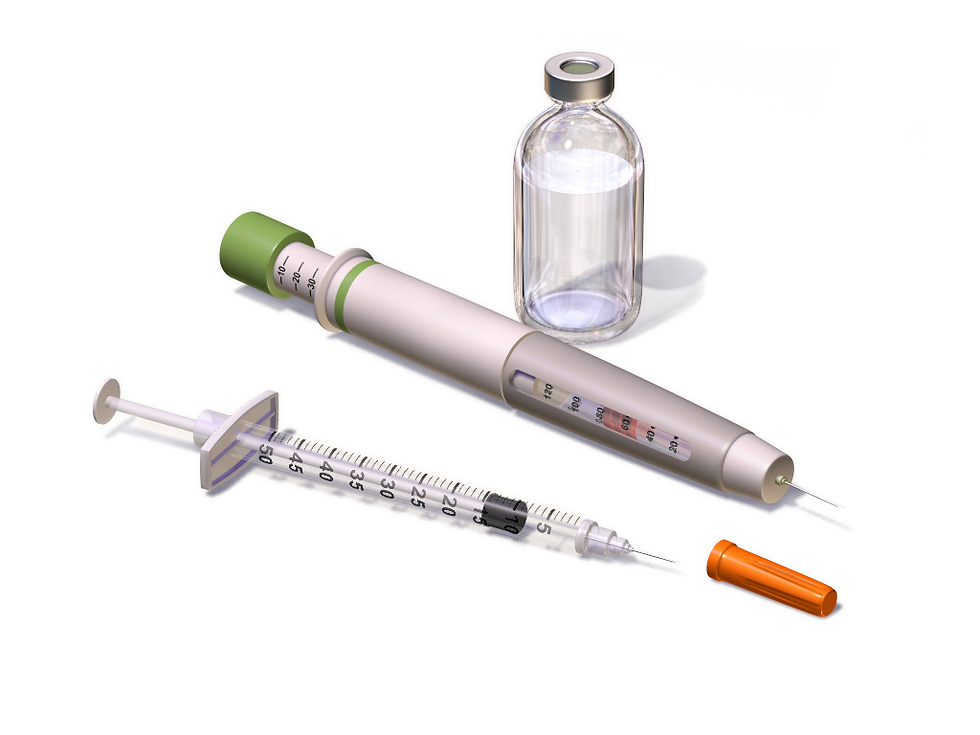"Sugar Causes Diabetes" and Other Misconceptions about Type 2 Diabetes

Diabetes is one of the most common diseases in the United States, affecting about 29.1 million people. There are two types of diabetes, Type 1 and Type 2. Type 1 is caused by genetics and other unknown factors, not by food or lifestyle. On the other hand, Type 2 is caused by a combination of genetics and lifestyle factors, like exercise levels and food choices.
What is Type 2 Diabetes?
For those who suffer from Type 2, their pancreas (which makes insulin) either doesn't make enough insulin, or their bodies become resistant to the insulin, which is called insulin resistance. When this happens, our cells don't have access to glucose, the energy from food.
Insulin acts like a key, and our cells are the door. When we eat food, our pancreas produces insulin, which unlocks the door to our cells and it lets glucose get in, which creates energy! This is how someone without diabetes gets energy from food: without thinking twice about it.
But, when there is not enough insulin for the amount of glucose floating around in our bodies, this creates a problem. Blood sugar levels, or blood glucose levels, begin to rise.
Risk factors for getting Type 2 include being overweight, being over the age of 45, having someone in your family who also has Type 2, and ethnicity are some examples. Now, just because you may have some of these risk factors does NOT mean that you will definitely develop Type 2. This is a myth, and there are many myths floating around on the internet about diabetes. Here is a list of common myths and the facts to debunk them.
Myth #1: If you eat too many sugary things, you'll get diabetes.

FALSE: Eating too much sugar will not give you diabetes. Diabetes is linked to being overweight and consuming too many calories, from any food group. If you consume only breads and savory foods, but eat 4,000 calories a day (a bit of an exaggeration, I know), you are still at a higher risk for getting diabetes. Cakes, cupcakes, candies, and sweets are not the culprit for diabetes. There is research, however, that points to diabetes being linked to drinking sugary beverages, but not just because of the sugar content. Some sugary drinks that are very high in calories include regular soda, fruit punch, fruit drinks, energy drinks, sports drinks, and sweet tea. They will raise blood glucose and can provide several hundred calories in just one serving.

For example, one 12 ounce can of regular soda contains 150 calories and 40 grams of carbohydrates. You know what else has 40 grams of carbohydrates? 10 teaspoons of sugar. So careful when consuming sugary drinks...always remember that water is best.
Myth #2: If you have diabetes, it's because you're overweight. And you have to lose a TON of weight to see improvements with your diabetes.

FALSE: Just because you're overweight, doesn't mean you'll automatically get diabetes. Being overweight is a risk factor, which means that your chances of getting diabetes at some point are increased.
And for losing weight? If you already are diagnosed with diabetes, losing 7% of your body weight (that's 15 pounds if you weigh 200) will help dramatically. Don't see weight loss as a daunting task: by just getting some exercise and healthier foods into your routine, you can make great changes to your overall health!
Myth #3: There are too many "off limits" foods for people with diabetes. The diet is so restrictive!

FALSE: There are no more "off limit" foods to people with diabetes than there are to people without diabetes. It's all about balance and moderation. You can still eat sweets if you're diabetic, but you have to be careful about portion sizes. As long as you are properly managing your diabetes with medication, exercise, and a healthy diet, there's no reason you can't have a piece of cake at a birthday party. Moderation is key. And this is true for those that don't have diabetes! Try and avoid high calorie, low nutrient foods like cakes, chips, cookies, and junk food. You can still eat them, but sparingly.
Myth #4: If you're taking insulin, you don't have to make any changes to your lifestyle

FALSE: Even though people with diabetes take insulin, they should still try and make lifestyle changes like change in diet, incorporating more exercise, and control through other oral medications. Managing diabetes is about changing the way you eat and the amount of exercise you get, to improve your overall health. By changing the way you eat and exercise, this can greatly improve your symptoms of diabetes. Don't solely rely on insulin to help you, because it will not be enough in the long run.
If you have been diagnosed with either Type 1 or Type 2 diabetes, there are many great resources! Come see a registered dietitian/ certified diabetes educator, to get started on your journey to health!



























